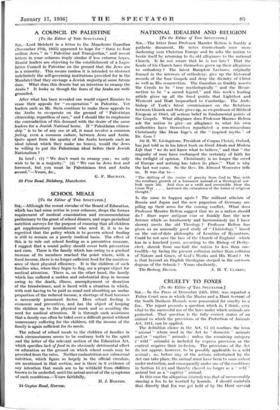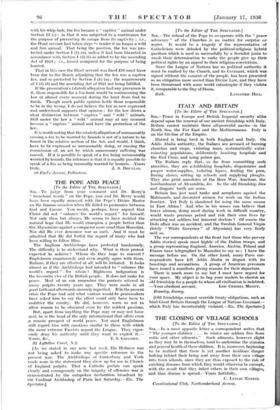CRUELTY TO FOXES
To the Editor of Tim SPECTATOR.] Sin ,—In the Press of December 24th, 1935, was reported a Police Court case in which the Master and a Hunt Servant of the South puilmm Hounds were prosecuted for cruelty to a fox. The report presents a question which is, I think, very Vital to the successful use of the laws under which animals are protected. That question is the fully correct status of an animal to which the provisions of the Protection of Animals Act, 1911, can be applied.
The definition clause in the Act, 15 (c) confines the term " animal " where used in the Act to " domestic " animals and /or " captive " animals ; unless the remaining category (" wild " animals) is included by express provision or the context requires their inclusion. The provisions of the Act do not appear, however, to be possibly applicable to a wild animal ; as, before any of the actions" entertained by the Act can take place, the animal must have been to some extent under restriction, and consequently under one of theconditions in Section 15 (c) and thereby clas4ed no longer as a " wild " animal but as a " Captive " In this case the allegation (stated) was that of unreasonably causing a fox to be worried by" hounds. I 'should maintain that directly that fox.' was got hold of by the Hunt'servant with his whip-lash, the fox became a " captive " animal under Section 15 (c): in that it was subjected to a contrivance for the purpose of preventing its escape from its captivity ; i.e., the Hunt servant had taken steps 4.r■ render it no longer a wild and free animal. That being the position, the fox was pro- tected under Section I (1) (a), unless it had been liberated in accordance with Section I (3) (b) as added to by the amending Act of 1921 ; i.e., loosed uninjured for the purpose of being hunted.
That in this case the Hunt servant was fined £10 must have been due to the Bench adjudging that the fox was a captive fox, and so protected by Section I (1) (a) ; the requirements of I (3) (b) and the amending Act of 1921 not being fulfilled.
If the prosecution's (stated) allegation had any gravamen in it, those responsible for a fox-hunt would be contravening the law at almost every moment during the hunt from find to finish. Though much public opinion holds those responsible to be in the wrong, I do not believe the law as now expressed and understood supports that opinion : for the law draws a clear distinction between " captive " and " wild " animals. Still under the law a " wild " animal may at any moment become a " captive " animal and have the protection of the law.
It is worth noting that the (stated) allegation of unreasonably causing a fox to be worried by hounds is not of a nature to be tinuid in the relative section of the Act, and would, I think, have to be expressed as unreasonably doing, or causing the commission of, an act by which unnecessary suffering was caused. If it is possible to speak of a fox being unreasonably worried by hounds, the inference is that it is equally possible to speak of a fox as being reasonably worried by hounds.—Yours truly, J. S. DOUGLAS. 38 Earl's Avenue, Folkestone.







































 Previous page
Previous page